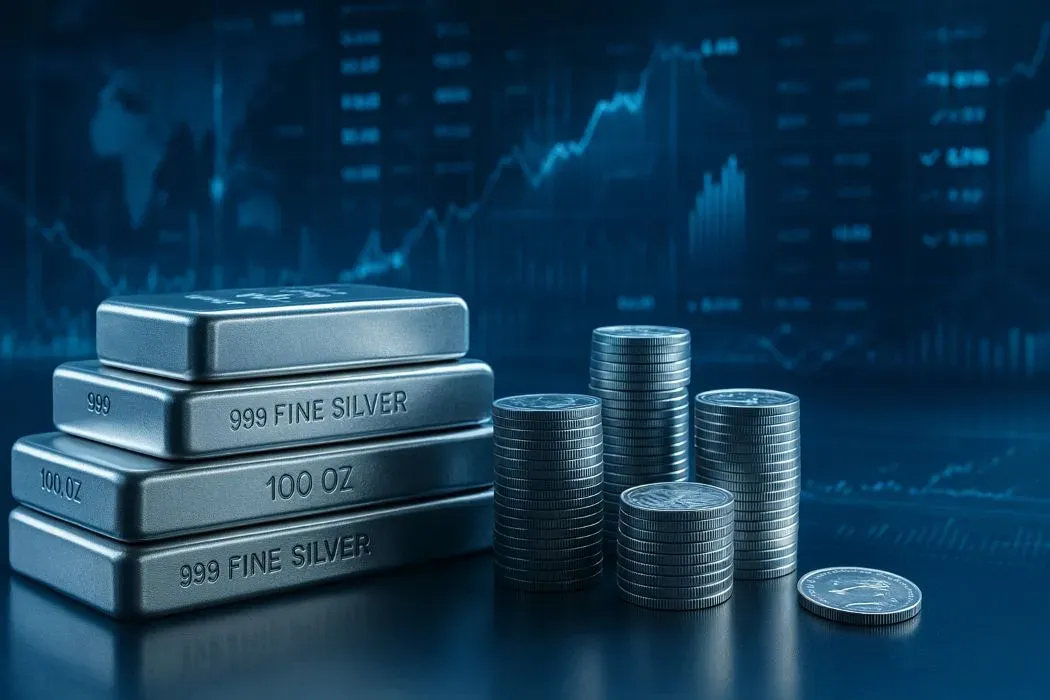
A New Era for Silver Investors
Silver is no longer the quiet counterpart to gold — it’s emerging as one of the most dynamic assets of the decade. With silver prices now exceeding $54 per ounce, investors and analysts alike are watching closely as momentum builds that could carry the white metal toward $100 per ounce.
Silver’s strength lies in its unique dual identity: both a critical industrial metal and a trusted store of value. From renewable energy to advanced computing, silver’s importance is expanding in nearly every sector — and the market is beginning to recognize just how indispensable it has become.
Key Drivers Behind Silver’s Record-Breaking Rise
1. Dual Power: Industrial Metal and Monetary Asset
Silver bridges two worlds — technology and finance. It’s vital for clean energy, electronics, and medical technology, while also serving as a hedge against inflation. That blend of utility and value protection keeps demand steady across economic cycles.
2. Solar Energy’s Soaring Demand
Each solar panel contains up to 20 grams of silver. With renewable capacity expected to triple by 2030, solar demand alone could account for a record share of total global silver consumption.
3. Electric Vehicles Drive the Market Forward
Electric vehicles require up to three times more silver than traditional cars. As EV adoption accelerates worldwide, industrial demand continues to climb — making silver an irreplaceable component of the green revolution.
4. Backbone of the Digital Age: 5G and Semiconductors
Silver’s unmatched conductivity powers circuit boards, AI servers, and next-generation 5G technology. Its electrical superiority ensures enduring demand as digital infrastructure expands.
5. Silver in Modern Medicine
From surgical instruments to antimicrobial coatings, silver’s medical uses are multiplying. Healthcare innovation adds a consistent stream of demand to an already tightening market.
6. The Hydrogen and Battery Revolution
Emerging clean technologies like hydrogen fuel cells and advanced batteries rely on silver-based components — setting the stage for long-term, structural demand growth.
7. Central Banks’ Subtle Diversification
While gold remains the cornerstone of reserves, central banks and institutions are quietly increasing exposure to silver through ETFs and bullion holdings, signaling renewed interest in silver as a monetary reserve.
8. Deep Undervaluation vs. Gold
With the gold-to-silver ratio hovering near 80:1 (well above its historic 40:1 average), silver appears significantly undervalued. A reversion toward historical norms could see prices double without any movement in gold.
9. Declining Mine Supply
Roughly 70% of silver is mined as a byproduct of other metals, meaning supply cannot easily ramp up — even as prices climb. That production lag fuels potential shortages when demand spikes.
10. The Global Shift Away from the Dollar
As de-dollarization gains traction among BRICS nations and emerging economies, many investors are seeking safety in tangible assets like gold and silver — reinforcing long-term bullish trends.
11. AI and High-Tech Expansion
The artificial intelligence boom requires enormous computational power — and silver is a key component of GPUs, processors, and high-speed networks. As data infrastructure grows, so does silver’s industrial relevance.
12. Rising Retail and Investor Demand
Retail investors are stacking silver coins and bars in record numbers. Seen as “gold’s affordable alternative,” silver’s lower entry cost and higher upside potential attract both new and seasoned investors.
13. Return of Tangible Assets
In an age of inflation and digital volatility, tangible wealth is back in favor. Silver offers ownership that isn’t dependent on financial institutions or market intermediaries.
14. Irreplaceable Conductivity
No other metal matches silver’s conductive efficiency. Even when prices rise, industries cannot easily substitute it — locking in demand for years to come.
15. Tightening Inventories
Vaulted silver reserves in major markets like COMEX and London have been steadily shrinking. Analysts warn that visible stockpiles could run critically low within two years, heightening scarcity concerns.
16. The Fusion of Silver and Digital Finance
Silver is gaining traction in the digital economy, with blockchain developers testing silver-backed tokens. This innovation connects physical bullion with next-generation trading ecosystems.
17. Sentiment Ready to Shift
Historically, silver rallies after gold — but when it does, it tends to outperform. With investor sentiment turning positive, silver could be entering its own explosive phase.
18. Industrial Resilience Meets Financial Fear
Even when markets weaken, industries can’t stop consuming silver. That resilience — combined with its monetary appeal — makes silver a rare asset that thrives in both booms and recessions.
19. Global Inflation and Fiscal Pressure
Persistent inflation, rising debt, and government spending continue to erode currency confidence. Investors seeking protection are increasingly turning to silver as a long-term store of value.
20. The FOMO Effect: Fear of Missing Out
As silver prices climb and headlines spread, investors rushing to participate can fuel additional demand. This psychological feedback loop often accelerates price surges in precious metals markets.
Track the Best Silver Prices with Bullion Hunters
In fast-moving markets like this, finding the best price is critical. Bullion Hunters empowers investors with cutting-edge comparison tools that track live prices from trusted dealers across the country.
With a single search, you can instantly:
- Compare real-time silver prices across multiple retailers.
- Identify the lowest premiums on bars, rounds, or coins.
- Lock in the best available deals before prices move again.
Whether you’re stacking for the long term or making your first purchase, Bullion Hunters ensures you never overpay for your silver — because every ounce counts when markets move this fast.
The Road to $100: Silver’s Defining Decade
Silver’s transformation from undervalued metal to global powerhouse is already underway. Shrinking supply, industrial necessity, and monetary demand are converging to rewrite the rules of the market.
At the current pace of adoption and scarcity, a climb toward $100 per ounce no longer seems far-fetched — it’s becoming an increasingly plausible outcome of today’s supply-demand imbalance.
For investors ready to seize this historic opportunity, the message is clear: silver isn’t just keeping pace with gold — it’s redefining the future of precious metals.
